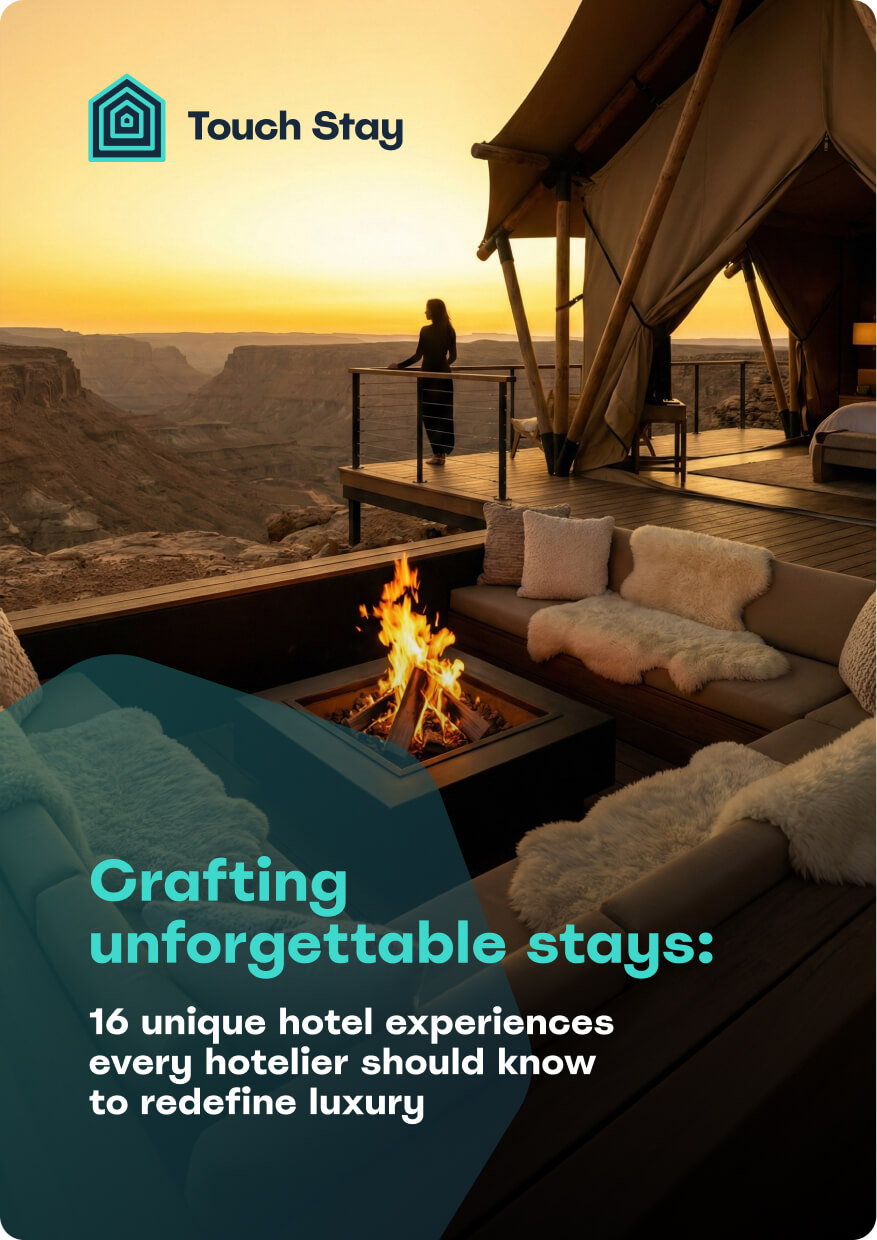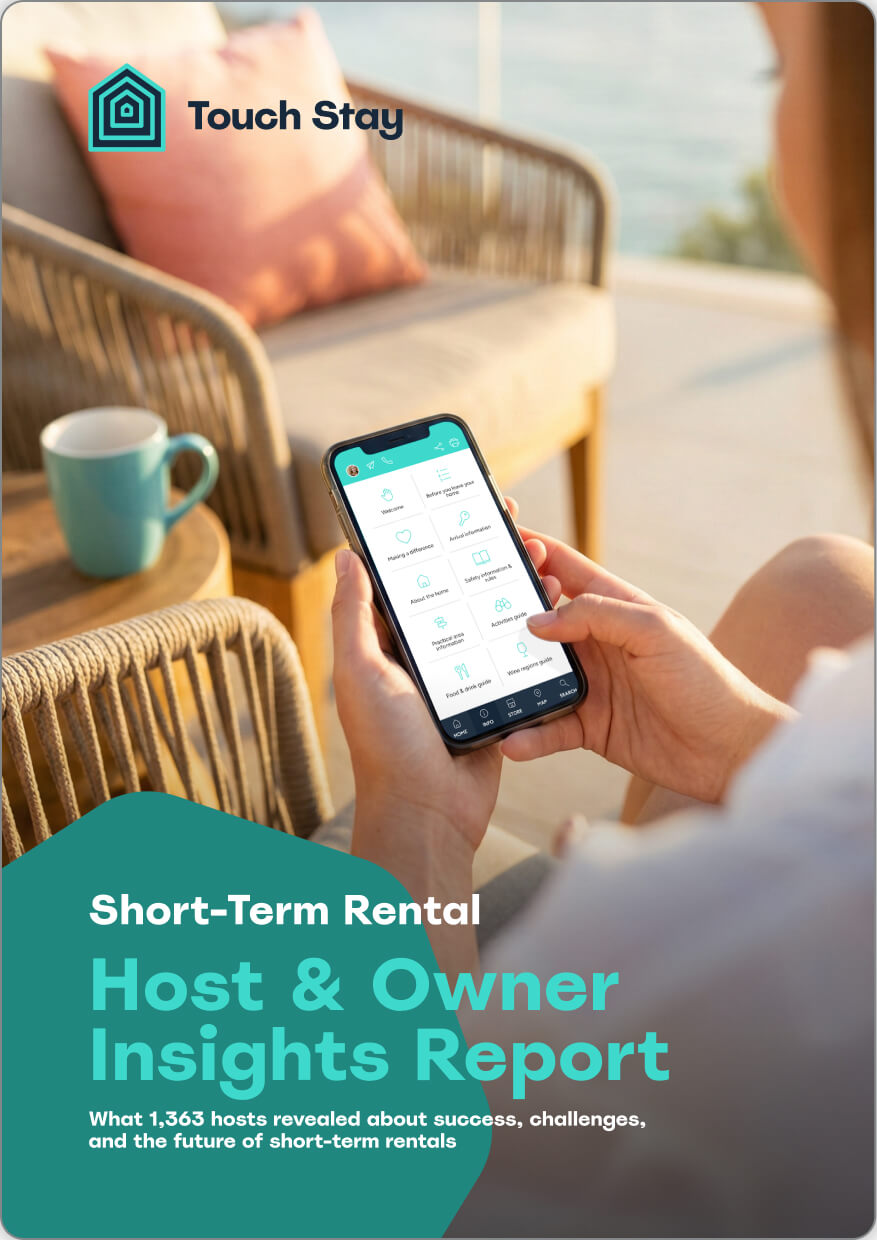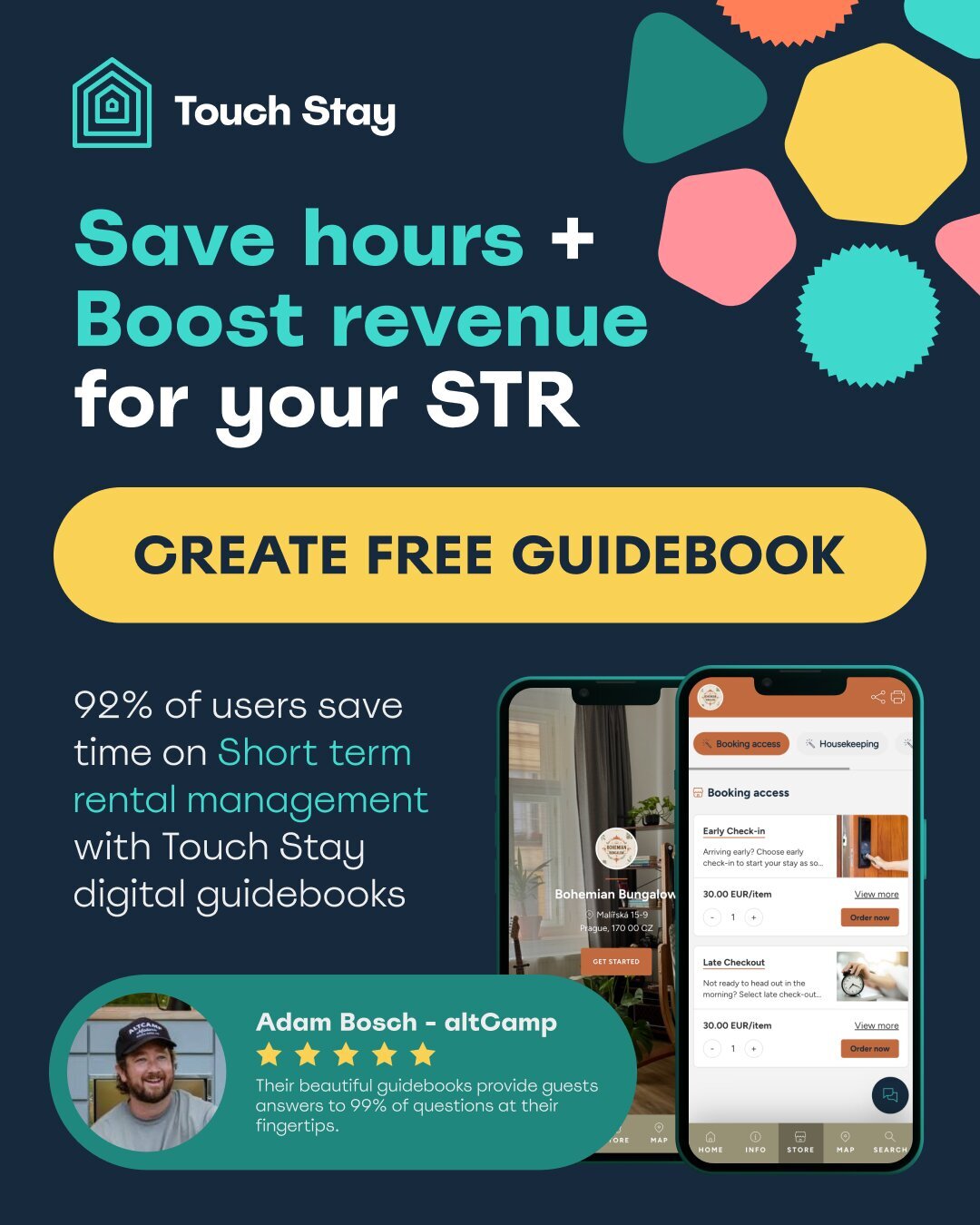We spoke to Outdoorsy about the joys and challenges of renting a campervan. The gang at Outdoorsy have years of combined experience holidaying in RVs, and we were lucky to get their pro insights into how you can make your RV rental business a success.
To get Outdoorsy’s inside knowledge, watch our conversation or read our summary of the top tips below. If you’re feeling really crazy, why not do both?
Whether you’ve got an RV, a campervan, a motorhome, a fifth wheel, or you’re loyal to your winnebago, Outdoorsy has some useful knowledge for you. These tips are for any recreational vehicle owner who wants to enhance their renters’ experience.
Looking to save hours on guest communications, and boost revenue with upsells for your RV rental?
Generate your digital guest guide in seconds
Simply paste your Airbnb or Booking listing link. No card required.
Why RV rental is a good idea
There are more than 54 million motorhomes sitting idle in the USA (yes, you read that right!). Outdoorsy was set up to get them moving again. They’re passionate about using RVs to get into the outdoors, and to reconnect with friends, family, and nature.
If you’re an RV owner, and you’re not using your motorhome as much as you thought you would, it doesn’t have to collect dust in your driveway. It could help other campers to have those incredible experiences, whilst earning you extra money!
By renting out your RV/campervan, you widen access to the great outdoors. You could help parents to introduce their kids to camping in the national parks, or a couple to take a romantic road trip.
Plus, you benefit too! With very little effort on your part, you could generate some extra cash. The average yearly income for someone on Outdoorsy renting out one RV is $40,000-$60,000!
We’d say those are enough reasons to at least think about it… Plus, with a Touch Stay digital guidebook, you’ll be equipped to keep your renters fully informed from the very beginning.
Outdoorsy’s top tips for RV owners looking to rent out their motorhome
To help you get started, we’ve summarised Outdoorsy’s top tips for RV rental success.
1. Accept that any RV rental will inevitably go wrong at some point
The most important ingredient for a successful RV rental business is a positive attitude.
You are driving a house on a road that is basically an earthquake; things are shaking, screws are coming loose, there’s hazards everywhere. Things will go wrong, there’s no way around it.
– Jessa Brown, Outdoorsy
Motorhomes are inherently quirky and tricky to use, and at the time of writing, 90 per cent of Outdoorsy’s campers were renting one for the first time. The best thing you can do is accept that there will be breakages, hassle, and an insurance claim or two, and from there just roll with the punches.
You can, of course, minimise the chances of anything going wrong by making all the info your renters need available to them from the get-go. Discover your indispensable information sharing tool with a Touch Stay digital guidebook.
2. Know your campervan inside and out
Of course, there are still ways that you can mitigate the risks! You should know your van better than anyone else out there, so that you can warn renters about its quirks, and advise them if anything goes wrong.
As a starting point, you should know what type of RV you have: a Class A motorhome, a Class B, or a Class C? The size of motorhomes varies significantly according to which class they fall into, so it’s critical that your campers understand the class of your vehicle and what this means.
Alternatively, you might own a travel trailer or caravan which needs to be towed by another vehicle. Ensure that your renters know what towing capacity their car will need to have in order to safely transport the trailer. Inform them of anything they need to keep an eye out for when hitching.
You’ve got to know your rig inside and out. Nobody should be able to troubleshoot it better than you.
– Jessa, Outdoorsy
The easiest way to get to know your campervan is to take it out for a long weekend. Investigate every rattle and bump – know what causes them, and if they need to be fixed. Perhaps take a friend with you, so the novelty factor is genuine – their reactions will be closest to those of your renters, just ask them to be honest along the way.
Do your due diligence. Have standard operating procedures in place, so that you can act quickly if anything goes wrong. Get your RV insurance in order so that you and your campers are financially protected.
Once you’ve got to know the ins and outs of your campervan, deposit all the info into a digital renter welcome book. That way, your guests can get to know it as well as you do.
How does Outdoorsy get to know their campervans?
As well as connecting renters with van owners, Outdoorsy manages its own RVs. The Outdoorsy employees take turns managing these vans throughout the year, so that they can immerse themselves in the experience of renting out an RV.
This willingness to get stuck in, and to really get to know your product, is crucial to a successful RV rental business.
3. Choose a comprehensive RV rental insurance plan
Given that things are bound to go wrong occasionally, you want to make sure that you’ve got a robust insurance plan to protect yourself and your renters. Research the insurance policy of any RV rental platforms that you use. For example, Outdoorsy covers the costs of renters putting the wrong fuel into your motorhome (a mistake which happens more often than you might realise!).
A digital guidebook could help to reduce your insurance liability. Use it to:
- set out clear operating instructions for your renters, minimising the chance of breakages
- outline renters’ responsibilities – insert a section telling them what your RV insurance covers, and what costs they’ll be responsible for
It’s also a good idea to recommend options for rental insurance coverage to your renters. Lending them your expertise in this area will be gratefully received. You’ll give them peace of mind, and could potentially save money and tears later on.
4. Manage RV renters’ expectations
Renting a campervan is very different to renting an apartment. You know this! There’s far more technical knowledge involved, and the renter takes on a lot more responsibility. If your campers aren’t prepared for this, they’re unlikely to enjoy their trip, and they’re more likely to break something.
Use your pre-arrival communications to make sure that your renters are prepared for the reality of a campervan/RV holiday. Ensure that they understand that the security deposit isn’t just a formality!
How digital guidebooks help manage renters’ expectations
Your digital guidebook includes all the information your campers could possibly need. From how to level the RV, to how to hook up to electricity, it’s all there. Plus, you can send it to them multiple times before their pick-up date, guiding them to a different topic each time and giving them numerous chances to read instructions beforehand.
For more advice on creating a top-notch digital welcome book for your motorhome, check out our article on how to create a digital guidebook for your RVs and campervans.
DISCOVER: exactly how a digital guidebook will support your communications with renters
You can also include photos and videos in your digital renter welcome book, to give renters a clear impression of exactly what your campervan looks like and to illustrate technical instructions. Your renters then know exactly what to expect before they arrive, and have an educational resource on-hand throughout their trip.
5. Establish a detailed orientation for your campervan and RV renters
Most Outdoorsy RV owners take their renters through a van orientation that lasts around 90 minutes. An orientation allows you to guide renters through the basics of campervan operation as well as the quirks specific to your van.
In addition to the operation of your campervan and important safety points, your walkthrough can also cover roadside assistance options. Tell campers what to do if they break down, and show them where they can find the number for your recommended roadside assistance service.
The length of the orientation shouldn’t really vary according to the experience of the renter. Whether they’re first timers or experienced RVers, all renters are new to your specific van. It pays to spend time making sure that they’ve been shown all the important details, and that all their questions have been answered.
However, it’s also a big ask to expect renters to absorb everything from that orientation.
A digital guidebook can pick up the slack from this point forward (even if you haven’t provided it to renters ahead of pick-up). It becomes a reference point for renters to return to if they need a refresher throughout the trip.
6. Be aware of common RV renter mistakes.
Knowing the mistakes that your renters are likely to make can help you to avoid them. The most common mistake that Outdoorsy sees is renters putting the wrong fuel into the van. It’s such an easy (and such a costly!) mistake to make. Outdoorsy knows this, and that’s why their insurance plan covers this situation for all of its rentals.
By knowing the mistakes that your RV/campervan renters are likely to make, you can select a suitable insurance plan and take measures to prevent these mistakes from happening:
- remind renters of the correct fuel type at the very top of your digital guidebook
- place a sticker on your fuel cap, with the correct fuel type in big red letters!
- hammer it home during your orientation – explain what happens if renters put the wrong fuel in
All of these steps reduce the likelihood of an expensive, time-consuming mishap.
10 minutes down the road and $25,000 later, you’ve made a really expensive mistake
– Jessa, Outdoorsy
7. Cater to the needs of your RV renters
We say this all the time when we talk about vacation rentals: know your guests. The same applies to RV/campervan rental businesses: know your renters.
The type of van you have will influence the type of renter who comes to you. A small campervan is likely to attract single travellers, or couples looking for a weekend getaway. A larger motorhome is likely to attract families. A winnebago is likely to attract larger family group renters.
These renters will want different things out of their experience, so how can you cater to their specific needs?
If you attract family groups, you could:
- tailor your digital guidebook to family-friendly activities, campsites, and places to eat
- provide family activities: games, balls, sports equipment
- offer add-ons such as bike hire
- place putty on any corner that’s dangerously close to a child’s head height
No matter what kind of renter you attract, we bet they all have one thing in common: when they’re on holiday, they don’t want to read! Long emails and unwieldy PDFs won’t cut it – they need clear, concise info presented in an engaging format. Deposit all the crucial details into a digital guidebook, and start welcoming more informed renters.
8. If you’re thinking about starting an RV rental business, just go for it!
The team at Outdoorsy had one final piece of advice for anyone thinking of renting out an RV/campervan: just give it a go. If you’re into the outdoors, and passionate about travel and nature, campervan rental will put you in touch with others who share your passion for the RV lifestyle.
There will undoubtedly be hiccoughs along the way, but if you can accept these as part of the process, you’ll have a brilliant time and a new income stream.
Outdoorsy supports you with a range of online resources. They also host an RV owner community forum, where you can ask other owners’ advice and get direct access to their pro suggestions. You’re not alone!
Use a Touch Stay digital guidebook to take your RV rental business to the next level
Touch Stay is your road trip safety blanket!
– Jessa, Outdoorsy
We created Touch Stay digital guidebooks to help rental owners communicate more effectively with their renters. Tailor your content to foreground the crucial information, and send it to renters via numerous different channels to ensure that they read it. You can even use Memo, our guest alert system, to schedule notifications and take a task out of your day.
A digital guidebook reduces the likelihood of breakages in your RV/campervan, and improves your renters’ experience by giving them all the info they could possibly need in one place. The answers to all of their questions are immediately available in their digital guidebook – possibly before they know they have them!
Plus, you can insert recommendations for your local area. Tell your renters:
- which campsites are worth staying in
- where the best wildlife spots are
- which outdoor activity centres they could try
- where to find the best ice cream
They’ll thank you for it! Touch Stay customers see fewer renter questions, and more five-star reviews.
Like the sound of that?

Laura Clayton
Laura Clayton is a copywriter with a BA in fiction writing from Columbia College Chicago. From holding a position as a background investigator retained by the United States government, to teaching English, and writing about real estate, Laura has a diverse and varied background. She has been writing for SaaS companies since 2019 in a wide range of industries.
Be the first to know!
Join our newsletter for early access to:
- ✅ Free guides
- ✅ Pro tips & tricks
- ✅ Time saving tutorials
- ✅ Latest blog posts
- ✅ Checklists & templates




















-1.png?width=50)
.png?width=50)
